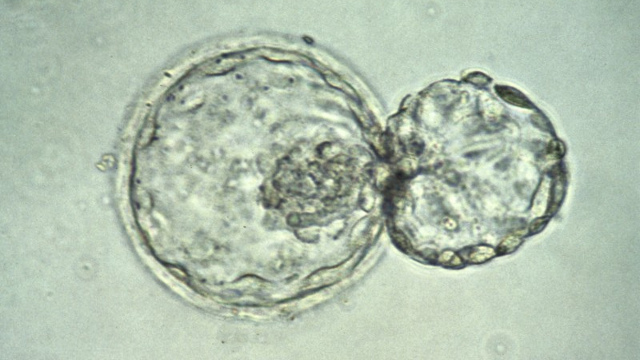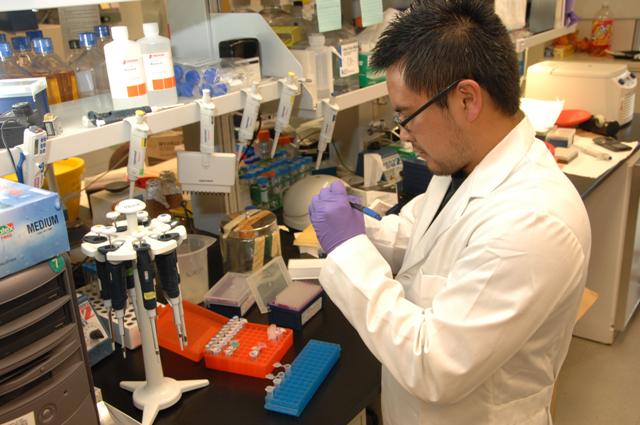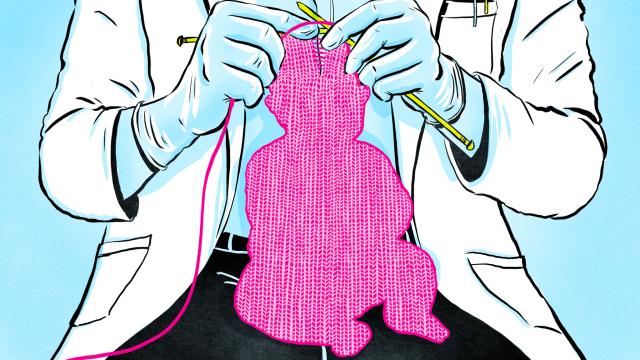Last week’s historic summit on human gene-editing has come to a close, and its organising committee has given the go-ahead for scientists in the US to experiment on human genes — only if it doesn’t result in a pregnancy. It’s a surprisingly progressive stance. But make no mistake, human trait selection is coming. Here’s why we’ll eventually accept the prospect of genetically modified “designer babies”.
The three-day International Summit on Human Gene Editing, held in Washington, D.C., brought together some of the world’s leading geneticists and bioethicists to discuss the prospect of editing the human genome.

(Credit: Wellcome Images)
The need for the summit arose earlier this year after scientists in China announced that they had genetically modified human embryos. Using a powerful and remarkably simple DNA cut-and-paste tool called CRISPR, the scientists modified a gene responsible for a fatal blood disorder. The resulting embryos were destroyed, but the achievement raised alarm bells among many scientists and ethicists. It was particularly significant because the scientists performed germline modifications, which means the edits would be heritable, i.e., they’d be passed down to the next generation.
Last week, the members of the organising committee issued a statement summarising its conclusions. They concluded it was OK for scientists to edit the genetic sequences of human cells, so long as it doesn’t result in a pregnancy. The committee’s recommendations were surprisingly reasonable — and even a bit progressive — especially considering the degree of concern expressed in previous months. Some scientists — even those who helped to develop CRISPR — went so far as to demand a moratorium on the practice. So this is good news. Science will be allowed to move forward.
At the same time, the committee made it clear that it’s not ready to accept the prospect of “designer babies”. Not only did they agree that the technology is still grossly premature (which is true), they also argued that this practice might never be accepted for technical, practical, and moral reasons.
There’s no question that some of the concerns expressed by the committee are warranted, but make no mistake — human trait selection is coming. A ban on making GMO babies is wholly appropriate for the moment, but it won’t — and shouldn’t — stay that way forever.
Acceptable Work
The committee agreed that basic and preclinical research should proceed. Once the appropriate oversight is put into place, the committee saw no reason to prevent work in the following areas:
- Developing technologies for editing genetic sequences in human cells
- Identifying potential benefits and risks of proposed clinical uses
- Understanding the biology of human embryos and germline cells
The caveat: any resulting human embryos or modified cells should not be used to establish a pregnancy.

(Credit: NIH)
This mirrors what’s happening elsewhere. British scientists working at London’s Francis Crick Institute recently submitted a request to the UK’s Human Fertilisation & Embryology Authority (HEFA) to use a gene editing technique to modify human embryos.
The gene editing committee also reaffirmed the practice of genetically altering somatic cells, i.e., manipulating cells whose genomes cannot be passed down to the next generation. There’s little controversy here, as most scientists recognise the relative efficacy and safety of the practice. Somatic gene editing could alleviate such conditions as cystic fibrosis, muscular dystrophy, certain cancers, sickle-cell anemia, and other genetic disorders. Unfortunately, the effects of somatic cell therapy are often short-lived, and patients require repeated treatments over the course of their lifespan to maintain the therapeutic effect.
That’s why germline therapies hold so much promise.
Drawing the Line at the Germline
Human germline engineering was the committee’s biggest concern.

We’re not quite ready for this. (Gattaca)
The committee objected to the potential practice on the grounds that CRISPR and other gene-editing techniques aren’t ready for prime time. There’s still considerable risk of inaccurate DNA editing, leading to off-target mutations and the incomplete editing of cells in early-stage embryos. Until these and other scientific/technical issues are resolved, scientists have no business making genetically modified babies.
As for the committee’s other objections, they’re considerably more abstract. While they agreed that gene editing could be used to eliminate inherited diseases, they warned that it could also be used to introduce novel or enhanced human capacities, such as extreme longevity, boosts to intelligence, and added physical strength. Some geneticists are worried that transhumanist-minded folks might use these biotechnologies on themselves to produce enhanced children, and thus trigger an “arms race” among parents.
The committee cited an obligation to consider broader implications, too, when it comes to heritable modifications: once introduced, it would be difficult to remove such genetic modifications from the human population as it spread through subsequent generations. There is also the “possibility that permanent genetic ‘enhancements’ to subsets of the population could exacerbate social inequities or be used coercively,” and that there are “moral and ethical considerations in purposefully altering human evolution using this technology”.
These claims aren’t entirely convincing, nor do they speak to the tremendous benefits to be gained by genetic engineering. In fact, a case can be made that we’re morally obligated to develop these tools as quickly as possible.
Much to Gain
“The benefits would be huge,” said NYU Langone Medical Center bioethicist Arthur Caplan. “Just huge.”
Caplan told Gizmodo that the practice would lead to dramatic cost reductions in medicine, and enable more people to marry and have children without the fear that they might pass on genetic problems. Gene editing would also enable our descendants to live healthier, longer lives. Caplan believes that human enhancement ultimately would make people “stronger, smarter, faster, saner, better rested, and more adaptable”.
Bioethicist and legal expert Linda MacDonald Glenn agreed, saying that gene-editing can increase human potential and productivity, while alleviating suffering and improving the human condition as a whole.
Oxford bioethicist Julian Savulescu said we should embrace gene-editing research on human embryos because it will help us cure genetic diseases, like cystic fibrosis and thalassaemia, and it will help us deal with complex diseases that can’t otherwise be tackled. Savulescu also said it will finally put an end to the so-called genetic lottery:
People worry that such technology could be used to create a master race, like fair-haired, blue-eyed “Aryans.” What this concern neglects is that the biological lottery — i.e. nature — has no mind to fairness. Some are born gifted and talented, others with short painful lives or severe disabilities. While we may worry about the creation of a genetic masterclass, we should also be concerned about those who draw the short genetic straw.
There are potential downsides. Caplan said that gene-editing might create an even wider gap between the haves and have-nots. He also warned that it may produce an intolerance of disability and imperfection, and a “narrowing” of human diversity.
Unfounded Fears
As MacDonald Glenn explained to Gizmodo, the committee members are hoping to prevent a potential unknown harm, a restatement of the precautionary principle.

(Credit: sabianmaggy/Flickr, CC BY-SA)
“The difficulty with the precautionary principle is that it requires proving a negative,” she told Gizmodo. “If we applied the precautionary principle to almost everything in modern life (bicycles, microwaves, cell phones), we would never have any innovation.”
What’s more, the idea that there are “moral and ethical considerations in purposefully altering human evolution [that may preclude us from] using this technology” is problematic. We most certainly have a moral obligation to influence human evolution with technology. To do otherwise would be to succumb to Darwinian selection, which works off a brutal process of trial and error, and often produces less-than-ideal results.
And as MacDonald Glenn explained, the very fundamentals of medicine would be threatened by a prohibition. “The primary moral argument behind gene-editing relates to the purpose of medicine,” she said. “The very purpose of medicine is to cure disease, and if the disease is incurable, to alleviate suffering. It is a quintessential element of compassion that we want to provide comfort and care to those who are ailing.”
And any proposed moratorium on human gene-editing would likely violate our reproductive freedoms. “It interferes with procreative choice, a notion that is recognised in the law and valued greatly in this country,” MacDonald Glenn told Gizmodo. “The government does not mandate how many children one should have or how we have them. Government interference in this arena would be an impingement on procreational freedom and harken back to the days of Buck vs Bell, where Virginia and other states involuntarily sterilised those they deemed ‘feeble minded.’”
As for the claim that some alterations might negatively affect future populations, and that these modifications would be difficult to remove, that’s another questionable unknown. Traits will be selected (or discarded) according to their efficacy. It’s reasonable to assume that if it’s good for the individual, it will be good for that person’s offspring. And if not, modified parents of the future, in conjunction with the technologies and norms of the day, will choose to “roll back” and revert to the original genetic blueprints.
Furthermore, genetic fixes and enhancements won’t happen in isolation. Parents, working with their doctors, will hew to established guidelines and oversight regimes. The idea that a “wild west” world of genetic enhancement awaits us in the future is unlikely.
Lastly, the committee’s claim that “the human genome is shared among all nations” is also questionable. A singular, discrete genome belongs to the individual, not “all nations.” And the suggestion that there even is a concrete and inviolable thing called a “human genome” is dubious. Earlier this year, geneticists scanned the genomes of 2504 people from around the world, allowing them to map the 88 million ways that humans are genetically different.
Reasonable Restraint
Despite those objections, the committee did not explicitly rule out the possibility that gene-editing in humans will be allowed in the future:
The international community should strive to establish norms concerning acceptable uses of human germline editing and to harmonize regulations, in order to discourage unacceptable activities while advancing human health and welfare.
We therefore call upon the national academies that co-hosted the summit… to take the lead in creating an ongoing international forum to discuss potential clinical uses of gene editing; help inform decisions by national policymakers and others; formulate recommendations and guidelines; and promote coordination among nations.
This is exceptionally well said, and extremely encouraging. The report isn’t calling for a moratorium, but rather, for an ongoing dialogue. The gene-editing committee could have very easily gone the other way, and set the United States back in this critical area of research. Now, over the course of the next few years and decades, we can expect to see the kinds of scientific advances that will result in safe, effective, and accessible genetic interventions.
